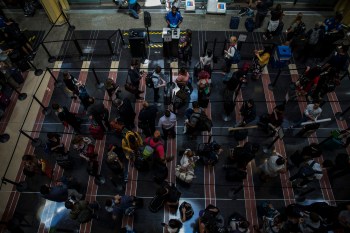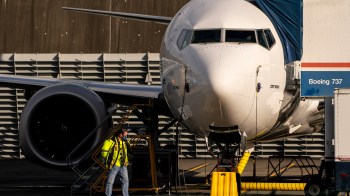Paying for upgrades under the tray-table
Flying is not what it used to be. What was once glamorous now feels like walking through a mall to get to a cattle chute. Airlines are expanding first class and squeezing coach passengers into tighter quarters. Every spare inch of space and every service from bag-checking to expedited security has a price.
So on a recent trip from Los Angeles to Chicago, I decided to try for my own upgrades. At every opportunity, I discreetly offered cash to airline employees, Transportation Security Administration employees and fellow passengers in exchange for a better seat or faster service. I wanted to know what would happen when institutional fees leave the institution and were offered instead on the black market.
I started at the United Airlines ticket counter, offering the agent a $20 bill for a seat upgrade. She refused, acting as though this kind of thing happened all the time. She pointed to a seat map on the screen. “This is the only upgrade I have,” she said. “It’s $85.” At security, I tried to slip a couple of twenties to the officer at the T.S.A. PreCheck line so I could breeze through. He gave me a look that said, “Nice try,” and pointed to the long line of people inching toward the body scanners.
Once I got to the gate, I approached the passengers in the roped-off section for premium fliers. I went down the line, one by one, offering cash for their seats. One man shook his head, barely looking up from his phone. Another appeared confused. I had to explain that I wasn’t trying to get on the plane; I had a seat in coach. He declined. “I’ve got to get some work done,” he said.
Nearly everyone seemed bothered by my offer. The closest I got to a yes was with a couple who did not want to split up for the flight; otherwise, they might have considered it.
On the plane, I could not persuade anyone in a seat with extra legroom to switch places for money. I was surprised; I said I was willing to go as high as $100 and told them I needed to sit close to the front to exit quickly once we landed.
Perhaps I appeared a little suspect to some people. I have a bushy beard and long hair. I could pass for a young Cat Stevens in the right light.
But I did talk to Debbie, a flight attendant who was not on my flight but who observes the behavior of hundreds of passengers every day. Debbie, who asked that I not use her last name, was a social worker at a mental hospital before becoming a flight attendant. “So I was used to working with unpredictable people,” she said, “and I was actually kind of surprised at the general rudeness and lack of caring about other people that I saw in passengers on planes when I first started.”
Now she’s used to it. She wasn’t surprised that no one took my offer of cash for a seat. She sometimes has trouble getting passengers to switch seats to accommodate families, even when she offers free drinks and a seat that isn’t a downgrade.
Once, while Debbie was flying off duty, the pilot announced that an emergency landing was needed. “The working flight attendants wanted to move me up front so that I could help with an evacuation if it was necessary,” she said. The crew asked first-class passengers if one of them would give up a seat for her, but none were willing to move. “Luckily we didn’t need to evacuate,” Debbie said. “But it was interesting that nobody wanted to move, even when a flight attendant is saying ‘This will help save your life.’”
I also ran my experiment by Tom Bunn, a former airline captain (whose employers included United) and a licensed therapist. He, too, was not surprised by the reactions I got, but for different reasons.
For many people, he said, the act of flying is incredibly stressful. It is not so much because of long security lines and cramped seats, but because of the psychological act of giving up control, of leaving solid ground. Settling into an assigned seat, he said, is part of the process of quieting their anxiety. “So any change they have to face, they would rather not face it,” Bunn said. My cash offer may not have been enough to justify restarting that process of calming themselves.
My own theory is that people considering my offer may have been afraid that they would be breaking a rule and could be kicked off the plane as a result. Recently, a group of ultra-Orthodox Jewish men traveling from New York to Israel caused a flight delay when they refused to sit next to women for religious reasons. Many of the men offered passengers money to exchange seats, which, it turns out, is not against many airlines’ policies.
I contacted six airlines, including United, to ask about their policy regarding passenger-to-passenger transactions. Delta, United, American and Spirit responded. Delta and American said they had no policy that forbade passengers from exchanging seats for money. Spirit forbids only switching to an exit row or to larger front seats, the airline’s first-class equivalent.
Rahsaan Johnson of United said it was against company policy for employees to take money from a customer in exchange for a favor. But United does not have a policy against customers exchanging money for seat swaps. “Seat assignment is not specifically prohibited at this point. Changing cabins is,” Johnson said. So, for example, if you are in coach, you cannot switch with someone in first class.
Of all the upgrades I tried to get, only one could have landed me in any real trouble: offering cash for access to T.S.A. PreCheck. “That’s not how the program works,” said Ross Feinstein, T.S.A.’s press secretary. “Bribing a federal employee, I believe, is illegal.”
It does however, seem to be legal to buy your way to the front of the T.S.A. line. “The actual T.S.A. process begins where someone checks your ID,” Feinstein said. Before that point, anyone ahead of you in line is fair game for an offer.
There’s a lot happening in the world. Through it all, Marketplace is here for you.
You rely on Marketplace to break down the world’s events and tell you how it affects you in a fact-based, approachable way. We rely on your financial support to keep making that possible.
Your donation today powers the independent journalism that you rely on. For just $5/month, you can help sustain Marketplace so we can keep reporting on the things that matter to you.


















